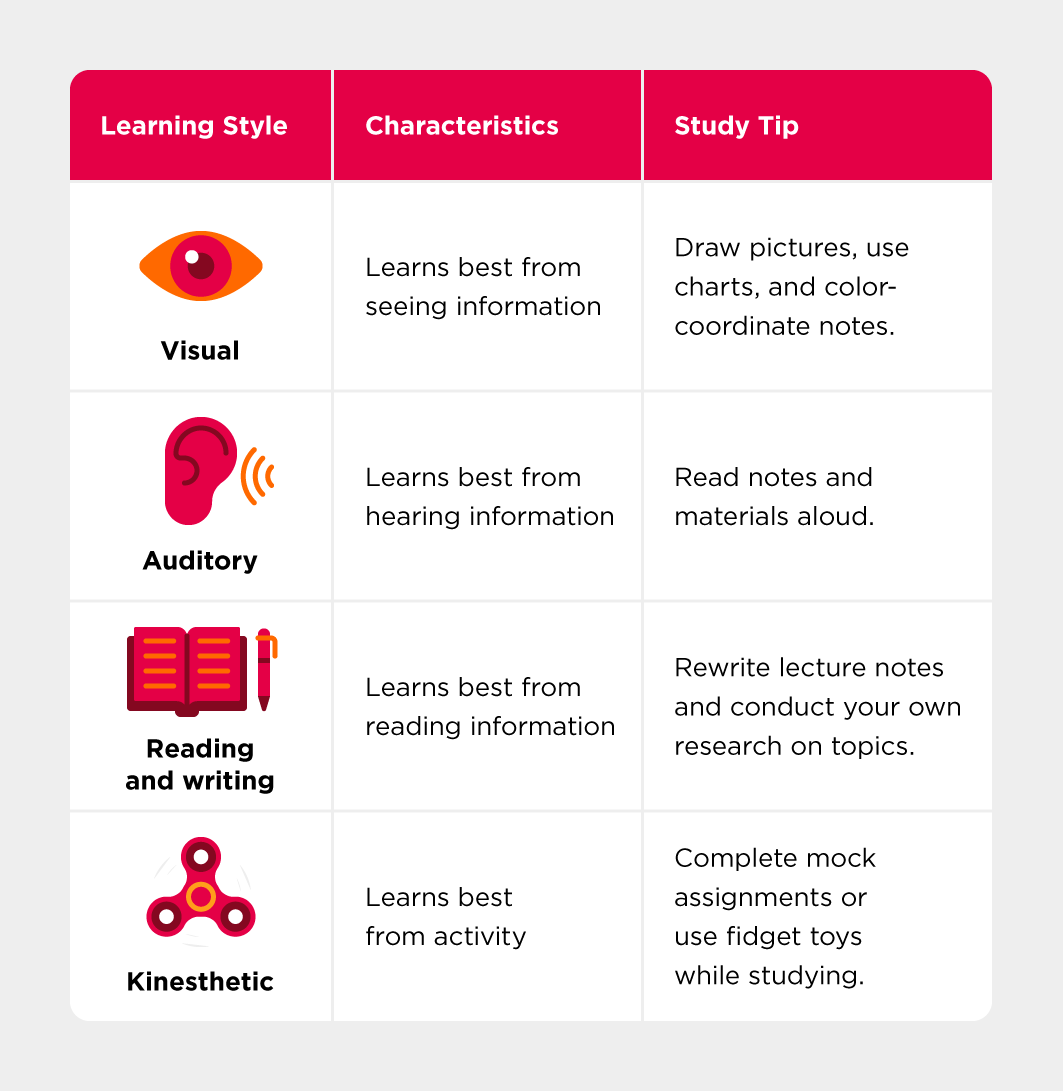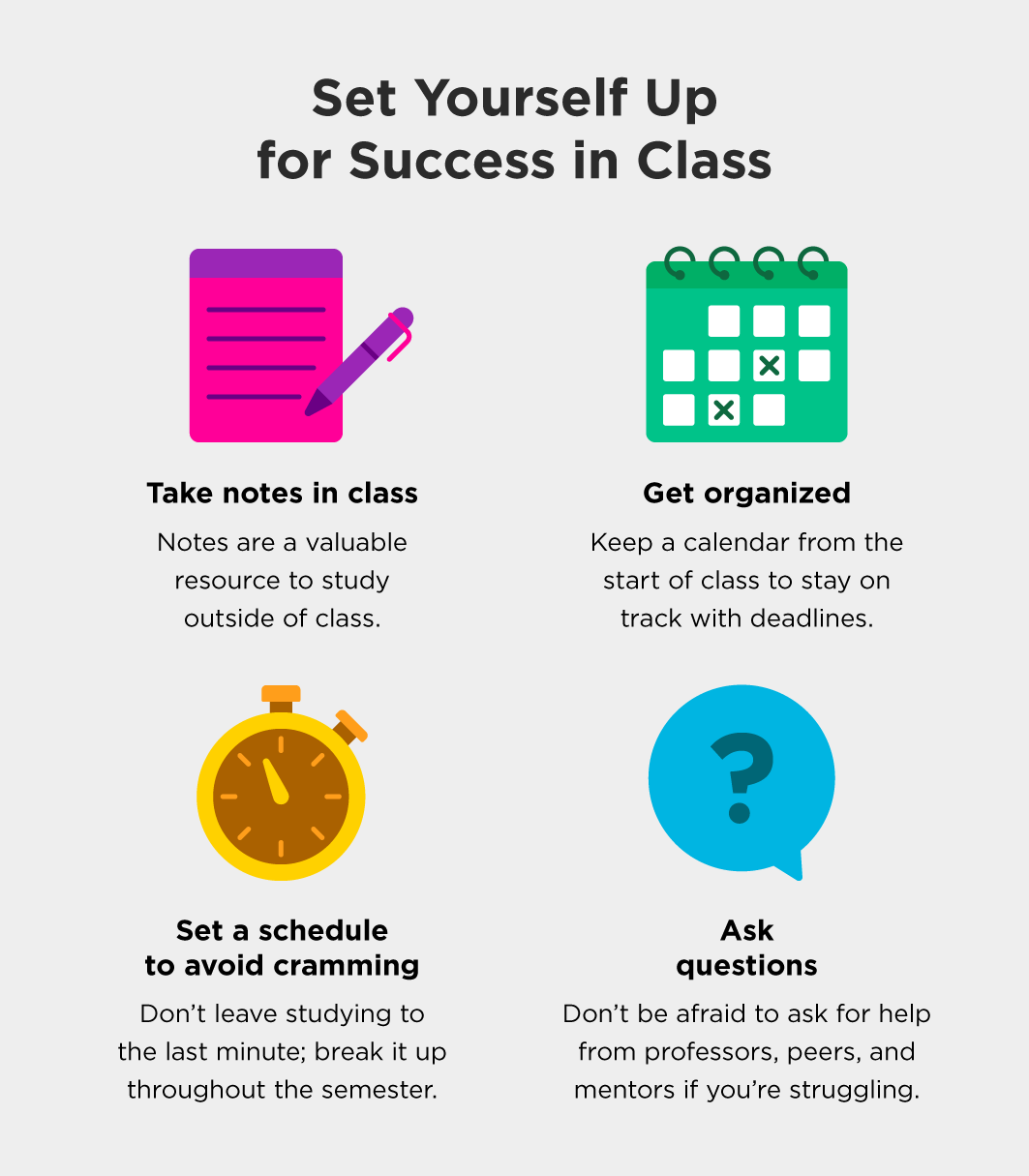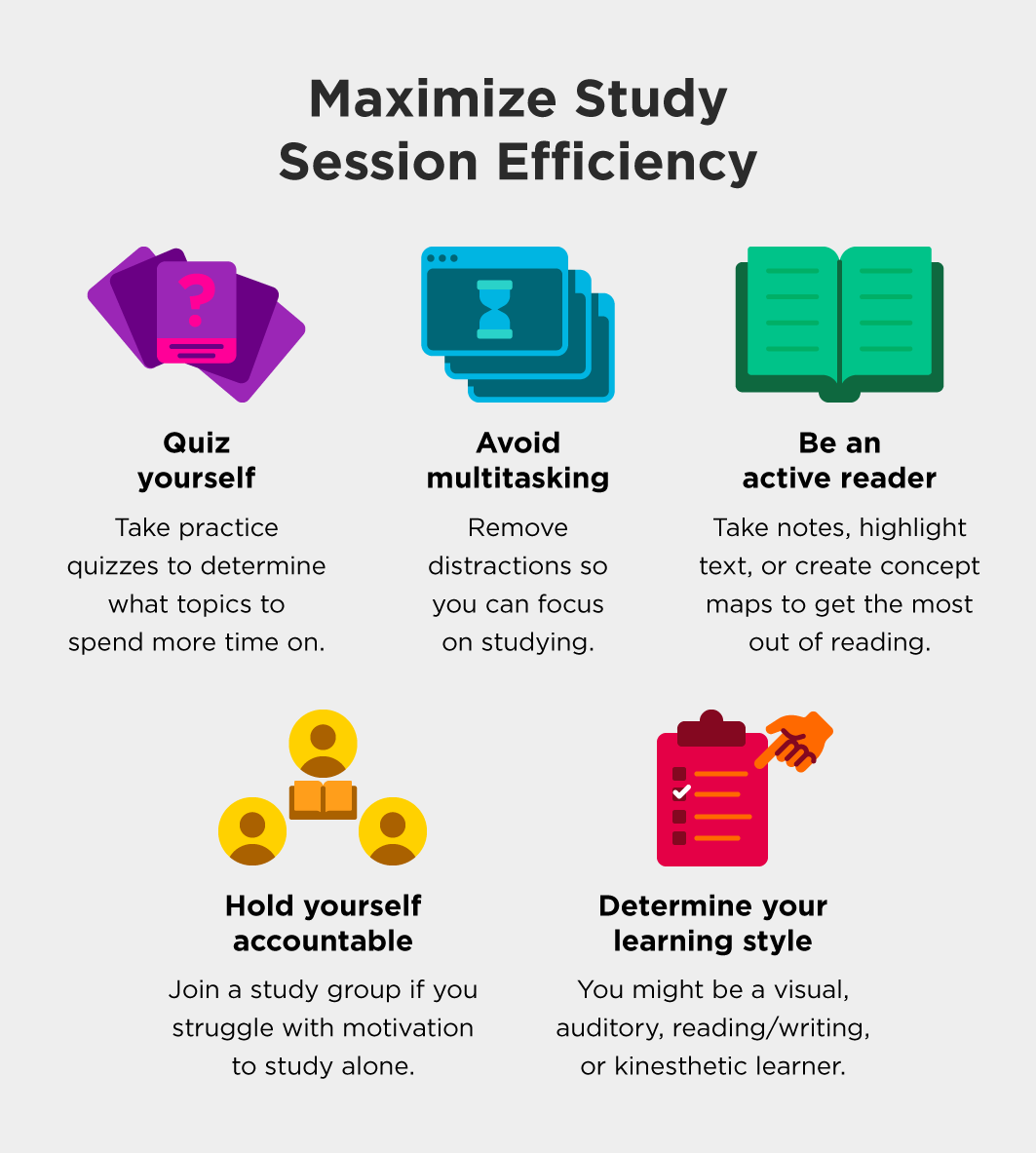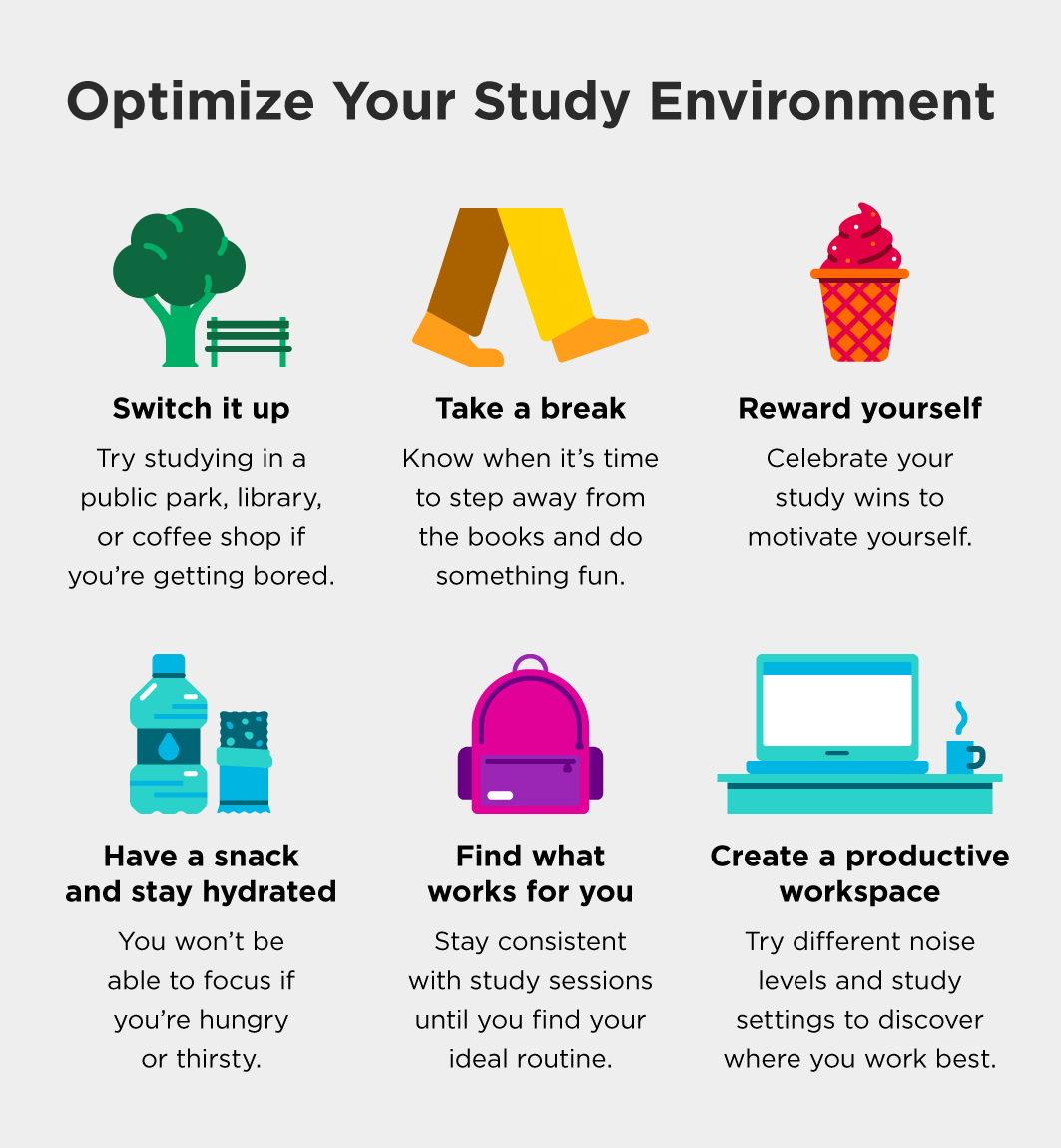How To Study Effectively: 15 Game-Changing Tips for Success

quick answer
The key to studying effectively is to develop a study schedule, create the right workspace, hold yourself accountable, and stay active in your studying strategies.
In This Article
Nearly everyone has had the panicked experience of staying up all night to study for a test. Maybe you procrastinated a bit or struggled to find the time to study in your busy schedule.
Students often have a lot of responsibilities outside of coursework. Learning how to study effectively helps you make better use of your time so you can succeed in class while still having time for work, friends, and family.
Below, we cover 15 tips to help you study better, improve your academic performance, and stress less.
The first step to becoming an effective studier is to determine what type of learner you are. Everyone is different, but knowing whether you respond better to hands-on learning or visual cues can give you a starting point to help you discover strategies that fit your lifestyle. Studying is a habit you can build, but it’s easier to start working with your natural tendencies instead of against them.
Check out the chart below to learn more about different learning types.

A disorganized schedule only compounds stress you might have from your responsibilities outside of class. Start on the right foot from day one and invest in a planner or notebook where you can keep track of deadlines and responsibilities throughout the semester.
Schedule study sessions early on. If you’re reviewing material bit by bit as you learn it, you’ll have less studying to do once exams come around.
Unless you have a photographic memory, you’ll never remember everything said during class. Even if you think you won’t need notes to remember the material, you can’t travel back in time if you forget a topic.
Writing notes is a great study tip and can also help you digest and remember the course material better. If you have trouble paying attention, sitting in the front or volunteering to be a class note-taker can help hold you accountable.
Last-minute cramming for a test isn’t just stressful — it’s also less effective for long-term learning. Knowing how to study effectively includes setting aside a little time each week so the work doesn’t pile up as the end of the semester approaches. Create a schedule and stick to it.
Take into account your personal schedule and how you focus best. If you’re an early riser, review some notes over your morning coffee. If you’re a night owl, hit the books on a day when you’re usually not too busy.
Sometimes, studying is better with a friend. Whether you create a small group or just have one study buddy, knowing someone else is relying on you makes it easier to sit down and do the work.
Try assigning different topics to different group members, where each person is responsible for becoming an expert and helping other members understand the material better. This makes studying a more collaborative process.
Do you ever find yourself reading your textbook but not actually taking anything in? That’s called passive reading. On the other hand, active reading is one of the best ways to study effectively. Here are a few common ways to turn reading a textbook into a more active activity:
Other active reading strategies include writing outlines, drafting practice presentations, or creating concept maps based on the material.

Just like everyone has their preferred study method, everyone works best in different environments. Some might study best in a busy coffee shop, while others prefer being alone in their room.
Finding your ideal workspace takes some trial and error. Consider switching up factors like:
Don’t be afraid to ask for help from teachers, mentors, and even other students while you’re studying. Sometimes, a second explanation or a different perspective is all you need to get your wheels turning.
When you have a question, whether in class or studying on your own time, always write it down right away. This way, you won’t forget it, but you can also continue listening to the lecture or studying until you’re able to get an answer.
Practice tests and quizzes are a valuable study tool that can break up longer study sessions and help you identify knowledge gaps. Quizzing yourself every so often reveals what topics you‘ve mastered and what you should spend more time on.
Whenever you feel stuck or a little bored with studying, a quick quiz can help you re-engage with the material and track your progress.
Multitasking is tempting, but research shows over and over again that it’s not effective. Try these strategies to cut down on distractions and focus on one task at a time:

You might be ultra-efficient at studying from home a few times per week, but many people get antsy if they’re stuck in the same place for too long. If you find your focus wearing off, try moving to a new location.
Coffee shops, libraries, and public parks can all provide a change of scenery without being too distracting. These places can help you reach your study goals without being stuck in the same room or office every day.
Taking breaks is an important part of the studying process you shouldn’t overlook. If you push through long study sessions without a break, you’re likely to burn out –– and ultimately spend much more energy studying than you need to.
Schedule your study sessions early and include breaks to avoid cramming at the end of the semester. This is an important part of practicing self-care and keeping your stress levels down.
Motivation is hard — reward yourself after a long study session to help keep your schedule feeling balanced. Make dinner plans with a friend or schedule a workout class at the end of your study session to maintain morale.
You can also build rewards into your study session. Maybe you earn a piece of candy for every chapter you read or if you get a good score on a practice quiz. Studying shouldn’t be a punishment, and these rewards help reinforce that idea — even if it isn’t your favorite activity.
Your brain needs the right fuel to power through your study session and feel more awake. You won’t be able to focus properly if you’re hungry or thirsty, so always make sure you have some water and a snack on hand.
Low blood sugar makes it difficult to concentrate, so make sure you’re snacking when you’re hungry. Start your day with a healthy meal and eat proper meals throughout the day, Always keep snacks on hand to maintain more stable blood sugar levels and choose foods with carbohydrates and protein to power your day without a sugar crash.
It might take some time to figure out which strategies work best for you. If your first couple of study sessions don’t go as you hoped, don’t give up. You’ll likely have some “off” days, but as long as you consistently dedicate time to the material, you’ll learn how to study effectively.

Read more about how to study effectively and check out these frequently asked questions below.
Five top tips that help you effectively study include determining your learning style, setting a study schedule so you don’t cram for tests, taking notes during class, quizzing yourself while studying, and taking breaks when you need them.
Most people aren’t able to focus entirely on studying, but ensuring you drink plenty of water, keep snacks on hand, and work in a distraction-free environment can help you focus better.
Create a study schedule at the beginning of the semester and stick to it. Breaking your study sessions into smaller, more manageable stretches will be less stressful and save you from cramming before a big test.
Everyone’s capabilities are different, but it’s generally recommended to study about two hours for each hour spent in class per week. Factors such as how many courses you’re taking, whether you’re working outside of class, and the difficulty of the material might mean studying more or less than that is better for you.
The best way to study effectively if you don’t have a lot of time is to pick and choose which topics are most important to study. You might decide to study the hardest topics only or study topics you know will appear on the exam. Try to break up your studying as much as you can to prevent burnout.
At Robertson College, we recognize that everyone is different. That’s why we’re dedicated to providing each student with the resources they need to study effectively. Ultimately, the best way to study depends on your individual style, preferences, and needs. Our Diploma programs offer both hybrid and online models, so you can find courses that work with your schedule.
Whether you choose to join a peer study group or go your own way, Robertson College helps students learn everything they need to succeed, including lifelong career support from our Workforce Team.
Learn more about studying at Robertson College today to get started on the next phase in your career.
In This Article
Once you take the first step, one of our Student Admissions Advisors will get in touch to better understand your goals for the future.
Apply Now